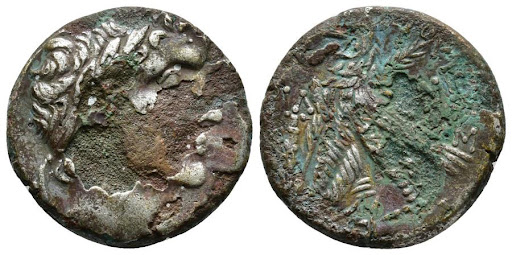Why are You Still Tithing?
Let me start by saying, if that's the way you choose to give that's totally up to you. Tithing (or not tithing), isn't a Heaven or hell issue.
Tithing according to the Mosaic Law was always agricultural unless the giver had to travel a great distance. Then, money was acceptable. Money existed long before the Law was given.
If God meant for money to be tithed, wouldn't He have required that rather than agriculture when He gave Moses laws regarding the tithe? Money was used as early as Genesis 23, by Abraham...so, well before Moses.
Grace (or New Covenant) giving is sacrificial.
There's no mention of continued tithing after Jesus died, buried and rose. And, when Jesus talked about the tithe in Matthew 23:23, He wasn't speaking in positive terms. He was talking about the hypocrisy of the Pharisees who liked to make a show of everything they (supposedly) did for God.
The Pharisees were over the top in everything-- just read that chapter as Jesus rebuked them. He wasn't giving them kudos for the tithe. In fact, just the opposite is true. They were not giving sacrificially. They were lining their pockets with silver and gold (to the detriment of God’s people)--and they could have given more.
While Jesus criticized the Pharisees, He took the time to commend the widow who gave her last, sacrificially. The Pharisees were known for putting harsh burdens on God’s people (that had nothing to do with the Law).
When the early Church gave, they actually brought everything they owned to ensure that the needs of every believer was met. There was no wealth gap.
Ananias and Sapphira weren't punished for the amount they gave; they were punished (severely) for the sin of deception. There was no mention of tithing or set amounts to be given. The fact that they held back some of their wealth wasn't an issue--they weren't required to give anymore than they could "cheerfully" give.
Jesus meant what He said. He also said, "to whom much is given much is required". How does that line up with the practice of tithing? It doesn't line up at all.
There's nothing just about forced (or coerced) tithing of monetary income. Just think of two tithers--one with $10,000 in monthly income and and the other with only $1000. It will be a much greater sacrifice for the one who has the least income. Now why would God expect that and then rebuke the Pharisees for putting such heavy burdens on the people of God?
Someone will probably surmise that the one who has the greater income probably has more responsibility. The truth is, much of that responsibility comes from choices made by the giver. Needs ad defined by Jesus are exactly the same for everyone, so anything over and above is a personal matter. Jesus said in Matthew 6 [GNT], “Make certain you do not perform your religious duties in public so that people will see what you do. If you do these things publicly, you will not have any reward from your Father in heaven.“You cannot be a slave of two masters; you will hate one and love the other; you will be loyal to one and despise the other. You cannot serve both God and money. “This is why I tell you: do not be worried about the food and drink you need in order to stay alive, or about clothes for your body. After all, isn't life worth more than food? And isn't the body worth more than clothes? Look at the birds: they do not plant seeds, gather a harvest and put it in barns; yet your Father in heaven takes care of them! Aren't you worth much more than birds? “And why worry about clothes? Look how the wild flowers grow: they do not work or make clothes for themselves". Our Jehovah Jireh not only knows what we need, but He promises that if we are focused on His Kingdom we will have our NEEDS met.
The problem is we generally think of wants as if they were needs. So while the lower income person needs to have these things, the wealthier person has his needs for those essential things (and so much more) met.
I am only attempting to give some food for thought, before we demean non-tither's who just might be giving all that they have; or before we demean those who give like New Testament Christians. Either or both could be outgiving you, particularly, in the eyes of God.


Comments
Post a Comment